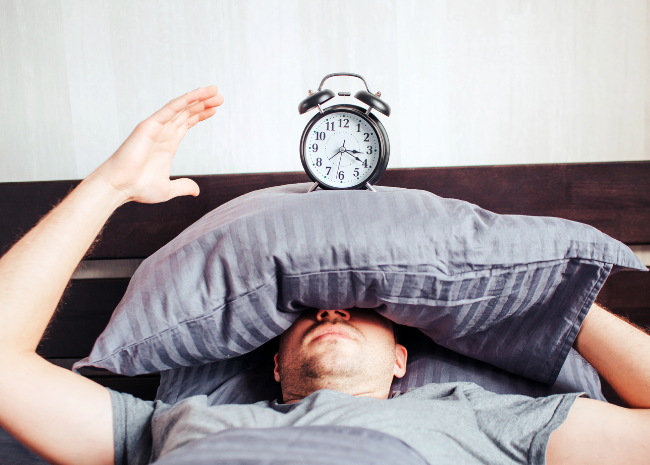
Answering: Why Does My Neck Hurt When I Wake Up in the Morning?
Waking up with a stiff, achy neck can be a frustrating start to your day. You might wonder why your neck feels this way, especially if you didn’t notice any discomfort the night before.
Morning neck pain is common, but knowing its causes can help you reduce and prevent it.
We will discuss:
- The role of your pillow and sleep position
- Age- and health-related causes
- Simple solutions for neck pain relief
- When to seek medical advice/physical therapy
Now, let’s explore why your neck might hurt when you wake up in the morning and what you can do about it.
The Role of Your Pillow and Sleep Position
One of the most common culprits behind morning neck pain is your pillow and sleeping position.
Pillow Problems
If you experience an achy neck when you wake up in the morning, your pillow habits could be to blame.
Your pillow’s job is to support your head and keep your neck in a neutral position, aligning with the rest of your spine.
If your pillow is too high, too low, too firm, or too soft, it can cause your neck to bend unnaturally, leading to strain and pain.
Here are some common culprits.
- Overstuffing the Space: Many people use more than one pillow or a thick pillow that overcompensates for the natural curve of the neck. This “overstuffing” can cause your neck to bend awkwardly, putting pressure on the muscles and ligaments.
- Old or Flattened Pillows: Pillows that have lost their shape or support over time can also contribute to neck pain. A pillow that is too flat may not provide adequate support, causing your neck to tilt downwards, while a lumpy pillow may not support your head evenly.
- Choosing the Right Pillow: Opt for a pillow that is firm enough to support your neck but soft enough to allow your head to sink in comfortably. Fluffy feather pillows are usually better than foam for providing proper support, as they conform to the shape of your neck, offering customized support. However, be sure to replace them as necessary, every year or so they can maintain their support.
Sleep Position Matters
Avoid sleeping on your stomach – especially if you already have preexisting neck issues.
This position can be particularly hard on your neck because it forces your head to twist to one side for prolonged periods.
If you’re waking up with neck pain, try switching to sleeping on your back or side. These positions help keep your neck aligned with the rest of your spine.
Daily Habits and Their Impact on Morning Neck Pain
While your bed and pillow are significant, your daily habits also affect how you feel when you wake up.
Poor Posture During the Day
- Sitting for Long Periods: During the day, help your neck by not sitting too long in one position. If you spend a lot of time sitting—especially if you’re hunched over a computer or slouched on the couch—your neck can become stiff and sore by morning. Try to take regular breaks and adjust your workspace to promote better posture.
- Holding Your Phone: Frequently looking down at your phone or holding it between your shoulder and ear can strain your neck. If you have frequent phone conversations, use a speakerphone or hands-free headset.
Reading in Bed
- Uncomfortable Reading Habits: If you read in bed often, try using a wedge pillow designed to hold the book in the proper position, so you do not hunch your shoulders and hold your arms awkwardly—a certain recipe for neck pain.
Potential Causes Related to Age and Health Conditions
If you’re over 50, or if your neck pain is persistent, it could be related to age-related changes or health conditions.
- Osteoarthritis: If you are over age 50, you could have osteoarthritis (age-related degeneration) of the neck, also called the cervical spine. This condition involves the degeneration of cartilage in the cervical spine and can lead to stiffness and pain in the neck.
- Disc Degeneration: As we age, the discs in our neck can lose their cushioning, leading to discomfort and stiffness.
- TMJ Issues: Your neck pain may actually be radiating from another area entirely. The temporomandibular joint (TMJ), which connects your jaw to your skull, can cause pain that spreads to your neck. This may happen due to teeth grinding, jaw clenching, or frequent gum chewing.
Simple Solutions to Relieve and Prevent Neck Pain
It’s important to reduce neck pain so you can use your neck fully and avoid your neck muscles becoming deconditioned, which can contribute to even more problems.
To address and prevent neck pain when you wake up, consider the following strategies.
1) Adjust Your Pillow and Sleep Position
- Choose a Supportive Pillow: Invest in a pillow that supports your neck without overstuffing it. Replace old pillows regularly.
- Modify Your Sleep Position: Try sleeping on your back or side rather than on your stomach to reduce strain on your neck.
2) Incorporate Daily Habits
- Improve Posture: Adjust your workstation and take breaks to avoid prolonged sitting in one position.
- Use Hands-Free Devices: When talking on the phone, use a speakerphone or headset to avoid straining your neck.
3) Easy Remedies
- Gentle Stretching: Incorporate neck stretches before bed and upon waking to keep your muscles flexible.
- Heat and Cold Therapy: A hot shower or an ice pack can help alleviate morning stiffness and pain.
- Physical Therapy: If neck pain persists, consider seeing a physical therapist who can offer personalized stretches and exercises to strengthen your neck and improve your posture.
If your neck pain continues despite these adjustments, it might be time to consult a healthcare professional.
When to Seek Medical Advice
If your neck pain persists despite making changes to your sleep habits and incorporating self-care strategies, it might be time to consider physical therapy.
A licensed physical therapist can assess your condition and develop a personalized treatment plan to address the underlying causes of your neck pain.
This tailored approach can help relieve discomfort and improve your neck function effectively.
Benefits of Physical Therapy for Neck Pain:
- Targeted Exercises: A physical therapist can guide you through specific exercises that strengthen the muscles supporting your neck, improve flexibility, and enhance posture.
- Manual Therapy Techniques: Physical therapists use hands-on techniques like massage, mobilization, and stretching to reduce pain and increase range of motion.
- Education and Postural Training: Learning proper posture and ergonomic techniques for daily activities can prevent future neck pain. Your physical therapist can help you adjust your workspace, teach you the right way to lift objects, and advise on better ways to use electronic devices.
Did you know you have Direct Access* to Physical Therapy? No referral, no problem!
Take Control of Your Neck Health
Neck pain can significantly impact your quality of life, but with the right approach, you can find relief and prevent it from coming back.
Start with simple changes to your sleep habits and daily activities, and don’t hesitate to seek help from our physical therapists.
Let’s get you back to doing the things you love without that annoying “pain in the neck.”
The Jackson Clinics serves 18 locations throughout Northern Virginia.
Find one near you: https://thejacksonclinics.com/locations/


















